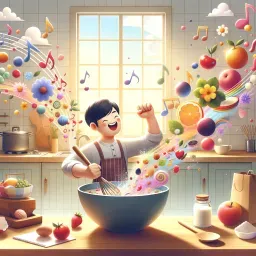”In every job that must be done,
there is an element of fun“

0
0
0
0
- Meaning
- This phrase conveys the idea that work doesn't have to be a dull or tedious experience. From a philosophical perspective, it reflects on the nature of work and play, suggesting that finding joy in responsibilities can lead to greater fulfillment. Psychologically, it highlights the benefits of a positive mindset, as incorporating fun can reduce stress and improve productivity. Historically, the notion links to the shift in workplace culture, where creating enjoyable environments is increasingly valued.
- Allegory
- The image elements—a whimsical landscape with playful characters, bubbles, and musical notes—symbolize the joy and creativity that can be found in any task. The vibrant colors and light-hearted activity convey the message of the phrase, reflecting the idea that with a positive attitude, work can be transformed into a pleasurable experience.
- Applicability
- In personal life, one can apply this phrase by incorporating enjoyable elements into daily tasks, whether it's through music, games, or positive social interactions. Finding ways to make mundane chores fun can transform experiences from burdensome to fulfilling, fostering creativity and satisfaction.
- Impact
- The impact of this phrase has been significant in promoting a positive work culture and has inspired discussions on integrating enjoyment into productivity. It has been quoted in various contexts, from corporate training sessions to personal development literature, influencing how people approach their daily tasks and responsibilities.
- Historical Context
- The phrase originates from the early 20th century, reflecting the changing perceptions of work during this period, especially as seen in the rise of child-centric literature and entertainment. The social context includes the emphasis on imagination and the value of childhood innocence in the early 1900s.
- Criticisms
- Some criticisms include the idea that not all work can or should be made fun, especially for those in challenging or serious professions. Arguments against the phrase suggest that it may trivialize the experience of those who face hardships in their jobs, emphasizing that not all tasks lend themselves to enjoyment.
- Variations
- Variations of this phrase exist in many cultures, with differing interpretations on the relationship between work and enjoyment. For example, in some Eastern philosophies, there is a greater emphasis on collaboration and harmony in fulfilling duties, reflecting the communal aspect of work.
-

There’s a snake in my boot!
-

If you can’t say something nice, don’t say nothin’ at all.
-

When life gets you down, you know what you gotta do? Just keep swimming.
-

A spoonful of sugar helps the medicine go down.
-

You don’t have time to be timid. You must be bold and daring!
-

Life’s not a spectator sport.
-

It’s kind of fun to do the impossible.
-

This is a tasty burger!
-

Even miracles take a little time.
-

You’re braver than you believe, stronger than you seem, and smarter than you think.
-

Sometimes, the smallest things take up the most room in your heart.
-

Imagination is more important than knowledge.
No Comments